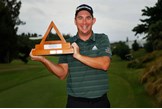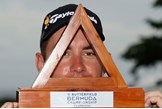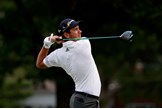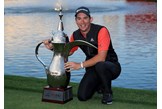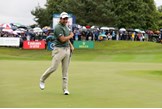Lucas Herbert: “I’ve got my life back to where I wanted it”
Published: Last updated:
‘I hit rock bottom. I didn’t pick up a club for a month until I rediscovered my love for the game’
In the wake of his momentous first PGA Tour win at the Butterfield Bermuda Championship, we take a look back at our exclusive interview with the big-hitting Australian, Lucas Herbert.
During our conversation, Herbert spoke candidly about his mental health issues, the shouting matches that threatened to tear his team apart, and how close he came to walking away from the game…
RELATED: Find out what Lucas Herbert has in his golf bag

With a beer in hand and surrounded by friends and family back home, Lucas Herbert is finally living the life he craved when he was at his lowest last summer. He is in a better place now, but the mental scars which remain are what make this interview so difficult and emotional.
The daily grind and pressure to perform on the European Tour had left him feeling overwhelmed and lonely, to the point where he wanted to be anywhere else. After hitting “rock bottom” at last year’s Irish Open, he didn’t play again for six weeks and almost lost his Tour card and friendships because of it.
But after a period of soul-searching – which led to his maiden victory on the European Tour in January 2020 – he is finally free of the worries that threatened to end his career before it had barely begun…
This enforced break has probably come at the worst time for you…
There are different ways to look at it. Yes, it’s frustrating that I can’t use that good form and confidence which you build from playing good golf. But if this had happened four months earlier, I would have been in a lot of trouble. I obviously employ people and I wouldn’t have had the money to keep doing that and to survive myself. Now, I’ve got my status locked up and there’s no concern about needing to play well or where I am on the Race to Dubai. I’m in an enviable position really.
RELATED: Tested – Longest Drivers
Before you holed the winning putt in Dubai, did you have to stop yourself from thinking about the money and the Race to Dubai points on offer?
Actually, I didn’t think about it too much, even during the hour gap between finishing and the play-off starting. What pleased me most was getting myself in contention for the weekend and playing well. When I got into a play-off, I was like ‘this has been a great week, regardless of whether I win or not’. That was kind of my mentality. I was going to be having a celebration that night whatever happened.
You did say in your press conference afterwards that you had a bottle of Scotch waiting at home. Just how wild was the party afterwards?
It was a pretty good night [laughs]. The bottle of Scotch comment was in reference to my 21st birthday. A group of my friends bought me a bottle of Blue Label Johnnie Walker and wrote a note on it which said I was only allowed to drink it when I won my first big tournament. That had been sitting in my cupboard for the last three years, so that was the first thing I thought of when I won.

Knowing that was there, was it almost an unwanted reminder that you hadn’t got over the line yet?
For sure. I mean, I hadn’t really won anything, even as an amateur. I won a US Open qualifying event as a pro, but that was the only thing professionally. It was probably a lot bigger than ‘just’ a first win because it was my first win in a long time. It was a big monkey off my back.
Looking back now, did you maybe expect too much, too soon?
We probably did put quite a lot of pressure and too much focus on my golf. We looked at the Presidents Cup in early 2018 and were like ‘that would be pretty cool to play given it’s at Royal Melbourne’, which is pretty much where I grew up. All of a sudden that idea was born. I had a good rookie season, but then from February through to June last year, everything changed. I wasn’t getting the results that I was after and I felt like there was a bunch of pressure on me. I was missing being away from home and it felt like I hadn’t seen my friends and family forever. It did make me think ‘you don’t have to be here’. It was a combination of a lot of things and it came to a head at the Irish Open. That was my rock-bottom moment. That was as low as I got.
Did you feel a bit homesick?
Absolutely. It’s so easy to travel when you’re playing well. But when you’re giving everything and the results aren’t coming, it’s hard. I mean, I was finishing back of the field after making the cut. I felt like I was so far away from where I felt I belonged, which was at the top of the leaderboard. Homesickness kicks in then. All I wanted to do was go home and have a beer with mates, but often I was signed up to play the next three tournaments…
What changed after the Irish Open?
Before I walked to the first tee on Sunday morning, I rang one of my friends back home and asked him to take a week off work and caddie for me at the Scottish Open. He was on a plane straight away and I think he even beat me to Scotland. After the first two rounds, I was nine-under even though every night we were going out, having a few beers and trying to forget about golf. To be honest, my team didn’t want me to play the Scottish Open. They felt it was only going to hurt me. But that was probably the first step towards enjoying the game again. I stopped putting so much pressure on myself and feeling like if I didn’t make a birdie, I had failed.
You then took six weeks off. How important was that break?
When I flew home, I said ‘I’m not going to play another golf tournament until I want to play another golf tournament.’ That was basically what I did. I put the clubs away, and didn’t really do anything productive towards my golf game, other than trying to mentally get myself back to enjoying my life again. It was a pretty rough time. I didn’t watch any of The Open because it was too hard for me at that point. I felt like I should have been there. Everything felt like it was at the worst point it could be. It was sort of like the kick in the guts I needed, I guess, to reset and be healthy and happy again. I look back on it as one of two rock bottoms I’ve had in my short life.
RELATED: Meghan MacLaren: “Every athlete is a human first”
There was another?
Interestingly, the middle of 2015 and then the middle of last year were my two rock bottom times. Hopefully that’s not going to happen in another four years’ time! I had a pretty good amateur career up until that point, but golf probably took a back seat when I turned 18. By the time I turned pro, I don’t think I had the skills or maturity or self-discipline to work as hard as I should have. I probably always knew I had raw talent but it was nowhere near polished enough to be top 10 quality. That was always people’s frustration with me because I was able to get results without really doing the work. It was a big learning experience and for the first couple of years as a pro I didn’t have the support from national bodies, funding wise. I had very little sponsorship and my mum, dad and I were paying for it all. It was another stage in my life where I had to make a decision because if I wasn’t going to make enough money from golf, I needed to give it up because otherwise I was going to burn a pretty big hole in my bank balance.
Did you come close to walking away from the game last summer?
When I flew home from the Irish Open, I knew there had to be conversations internally about whether this was what I wanted to do anymore. That was as far as it got. I’ve got a bit of a theory that when you try to make a decision on two things like that, if you flip a coin you don’t even have to wait for the coin to land to know which decision you want it to be. Internally, you always know. So, I was asking myself, if I ring up somewhere looking for a job tomorrow, is that seriously want I want? And I don’t think I could ever say yes to that. Playing golf is what I want to do.

Do you think you reached a stage when you were suffering from depression?
I wouldn’t go as far as diagnosing it clinically, but yeah… I was unhappy. I think depression is very internal, whereas mine was very situational. I was putting myself in bad situations and it wasn’t helping. But once I made some hard decisions, I got my life back to where I wanted it.
Can you elaborate on what some of those ‘hard decisions’ were?
Anything to do with people’s wages can get really difficult. We’re all good friends in my team, but they are employees as well. A lot of my stress was around how much I’m paying these guys. They’re hard conversations to have, especially when you want to come out the other side with friendships still intact. We had various meetings lasting four or five hours where we would get everything out in the open.
What was the atmosphere like in your team afterwards?
It was a tough five weeks and for a period after that, probably until the end of the year actually. Stuff was said that could have been very hurtful. So, for us to come out the other side the way we have is the best-case scenario for me. I’ve ended up where I am because of the experiences I’ve been through. And when you have a win like I did in Dubai, it’s even more emotional and brings everyone together a lot more.
It’s been well documented that Andrew ‘Beef’ Johnston has suffered with anxiety and mental health issues. He even wrote a player blog on the European Tour website about it. Did you ever seek him out for advice?
Funnily enough on the Saturday at the Scottish Open, I was in the locker room and Beef walked in and asked me how I was. All of a sudden it opened up a can of worms. We sat there for an hour, just chatting about everything.
When he wrote that player blog, I remember telling all my team that is exactly how I feel right now. It was so good to talk to him because being a professional golfer is such a good job that no one sees it being hard. You can’t really complain but there are times when it overwhelms you. Having someone there who’s so supportive and understands was great. He messaged me quite frequently during my time off and we still message a little bit now.
RELATED: Tyrell Hatton: “Being robbed at gunpoint was terrifying”

Have any players opened up to you?
Quite a few, especially the Aussie guys. We’re all in similar boats with how many weeks we spend away from home. But… I never intended to be a voice of mental health; I was just sharing how I felt and hoped other players would join me in speaking up. And if I’ve managed to help in some way, I’ve fulfilled a task which makes me proud.
On a happier note, you’re now on the cusp of breaking into the world’s top 50. Do you have ambitions of playing on the PGA Tour?
That’s where the best players play and where the most money is. But Europe is where I started and it gave me a lot of opportunities to get me established. That’s something I’ll never forget, so the European Tour is where my heart is always going to be. Even if I was playing a full-time schedule on the PGA Tour, the Rolex Series events would be part of that.
Did you set any goals at the start of the year and if so, how do they compare to now?
When I sat down in Abu Dhabi, my first goal was to make the top 40. It was as simple as that. I had about 20 goals written down which got tougher and tougher. The first week I used them was in Dubai and there were only two goals that I didn’t tick off. One was a season-long goal of not missing a cut and the other was to shoot 67 or better on the weekend. I shot 68 on the Sunday so I missed that by one. In Saudi Arabia, I added another goal of making two top 40s in a row so while I could have felt disappointed at finishing 28th, I still ticked off five goals that week. That put me in a positive frame of mind so that’s all I want to do when we get back to playing.
Does not knowing when your next tournament is going to be make it hard to prepare and practise?
A little. I’ve put the clubs away for a while and I’m doing a lot more physical stuff in the gym. I was pretty happy with where everything was at technically before the break and that doesn’t really go. Plus, I had some time off before Abu Dhabi and obviously got my game in a place where it was good enough to win second time out. So, the way I look at it is there’s no reason why I can’t do that again when we do resume playing tournaments.
READ NEXT: Matt Fitzpatrick: ‘I’ve got to start competing in the big events’

